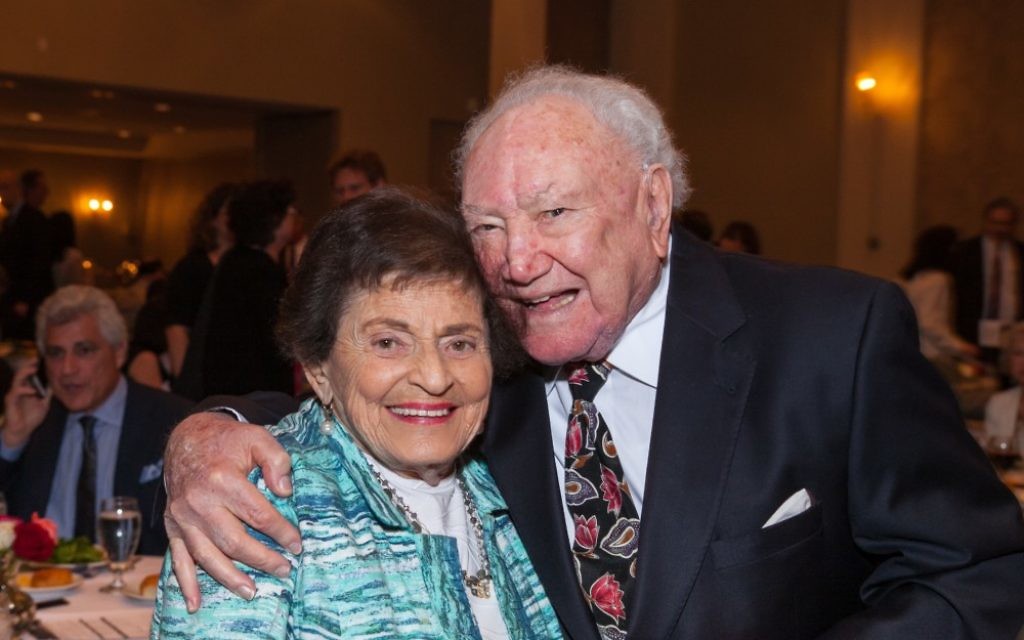Still Happily Married After 75 Years
Helen and Irving Lipsky wed two weeks after Pearl Harbor
“There aren’t that many people who celebrate their 75th wedding anniversary,” Temple Sinai member Ina Enoch said about her parents, married in 1941 just after the United States entered World War II.
Enoch, a child and adolescent psychologist, introduced Irving and Helen Lipsky to the AJT at her Sandy Springs home, though the Lipskys, now in their mid-90s, occupy an apartment at an assisted-living facility in Buckhead.
Get The AJT Newsletter by email and never miss our top stories Free Sign Up
“We’ve been there going on eight years,” Irving Lipsky said. “Came from Charleston, South Carolina — lived there 40 years. It was hard to leave, very hard. I became ill, and the children said, ‘It’s very difficult to come and visit and help; please come here.’ I was retired then, so my wife and I agreed, and here we are.”
Mutual friends introduced the two at a New York party when they were teenagers.
“I asked her to dance. She accepted, and we both liked dancing, and after that time I never let her go,” Irving said.
They tied the knot two weeks after the Japanese attack on Pearl Harbor. “The plans were made,” Helen said. “We didn’t want to change them.”
“The war broke out, and they wanted to take me immediately because I worked for a firm that was making torpedoes,” Irving said. “They wanted me to go to the Navy, of course. I wanted to join the (Army) Air Force. It’s a funny thing: If you get hurt, you’d rather get hurt in the air and die (instead of) the water. … That was my theory.”
Irving, who had never been in an airplane, became an instrument flying instructor for four years in Wilmington, Del., and then Nashville.
Helen got a job as a secretary at DuPont. “They were not really interested in hiring Jewish people,” she said. “I made no bones about it. I said, ‘I’m Jewish.’ So I worked for them for years. They treated me very well.”
The couple experienced a radical change of lifestyle when they moved to the segregated South in 1946, settling in Charleston. Irving was a department store manager in New York, and the company offered him his own, much bigger location in South Carolina.
Irving noticed on arrival that black people stepped well out of his way when he walked down the street. Confused, he was told by colleagues that local law required it.
“I saw a Southern way, a different way of doing things, which I didn’t like because I wasn’t used to it, you know?” Irving said.
He later advertised for a bookkeeper. “A black woman applied, very nicely dressed, quite educated; her husband was a captain at the Air Force base. I tested her, asked questions; she came out with flying colors. Afterwards, a group of about 10 white people came in and said, ‘We understand you have a black woman working here in your office.’ ‘Yes,’ I said, ‘she’s very good.’ ‘We don’t care; we don’t allow it. If you give us any lip, we’ll burn you down.’ So I threw them out.”
Instead of burning the building, he said, they broke the six or seven windows he had at his office. Word got around that the store was friendly to blacks. “They said, ‘We feel at home here,’ so I had a nice clientele of black people.”
The couple made a name for themselves as volunteers, with Helen helping at a hospital and Irving giving his time to veterans, among others. “Don’t go into a VA hospital,” he said. “I saw what was going on there, and I felt sick.”
The Lipskys won accolades for their efforts, including South Carolina’s highest civilian honor, the Order of the Palmetto. “We went to Israel three times just to volunteer, for about a month,” Irving said. “The third year we received the Ben-Gurion Award. They felt we were helping people. It sounds corny, but we were just making them smile.”
With three children, six grandchildren and four great-grandchildren, Helen and Irving attribute their longevity to altruism and the fact they talk to each other.
“We are very happy together; we are old friends,” they said, almost in unison.







comments